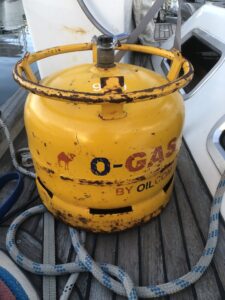Friday afternoon, we had arrived in Luderitz. We are in Namibia. Windsong is a speedy vessel. It had taken just over three days from Cape Town to here. By four in the afternoon, we had the anchor out, instruments put away, and a beer in our hand. Too late to get the dinghy out and go to shore for immigration and customs formalities.
The next morning, we pump some air into the dinghy; inevitably, these things leak and need a top-up. It turns out it wasn’t the only thing leaking. Air was leaking out while water was leaking in. A bit of a hole in the bottom, which we’ll have to repair, but for now, we’re bailing to keep our feet dry. We are pretty far out, as we were told to anchor there, but we can move the boat closer to shore tomorrow and moor on a buoy.
Immigration and Customs were painless, easygoing. In addition to them, we had to check in with Port Control, the harbor master. So far, I have never had to do that. Always something new around the corner, and it only took minutes. What did not take only minutes was acquiring a SIM card.
I showed up at the MCT store (Mobile Telecommunications Company) with my passport in hand. I had learned by now that quite a few countries require passport information before they hand over a SIM. I don’t know the reason.
The three employees in the store, seated behind their desks, were already helping people, and I became number four in the lineup of people sitting on the couch. When it was my turn, I proceeded to the third desk and was handed a form to take to the police station. It turns out one needs police approval to get a SIM. Chris, good old Namibian name, pointed me in the right direction, and off I went for a couple hundred meters up the road.
The reception area of the police station is surprisingly small for a building quite that large, with the walls lined with wooden benches. Five people from other boats are waiting in line to have their forms filled out by two police officers standing behind the wooden counter with the obligatory covid glass. As far as I could see, that’s the only thing these two officers were doing, filling out those SIM forms. My turn came, and I handed over my form from MCT, but the officer drew one from a stack of pre-stamped and signed forms from behind the counter. He copied my passport information on the paper, gave it one more stamp for good measure, and I was on my way back to the MCT store.
Back in line and then to desk one. I forgot the person’s name. “Passport please.” I could not see the screen, and hence don’t know what was being entered, but it was five minutes of solid typing. He then handed me a package with a SIM card and a bent paperclip to open the phone. SIM installed, data loaded by entering a long string of numbers, three gigs for seven days. I bought two extra packages to enter after seven days or when the three gigs run out. Whatever comes first. However, nothing happened. The person behind desk one is quite surprised. He wanted to see the phone, looked at it from all angles, consulted his computer, and then looked at me and said, as if I didn’t know, “It’s an iPhone.” No kidding.
“Don’t you have iPhones in Namibia?”
“Yes, we do.”
“Oh.”
It wasn’t a problem. It takes longer for a SIM to register on an iPhone than an Android. And indeed, a couple of minutes later, I had usable data.
But we weren’t done. I now had to move to desk number two. Desk number one person handed my passport to desk number two person called Dinari. Dinari then stood up, picked up a phone, and had me stand against a white wall, glasses off, and took my picture. Back at his desk, he connected that phone to a fingerprint scanner. Left hand, right hand, and thumbs. Seriously, I only wanted a SIM Card and some data.
